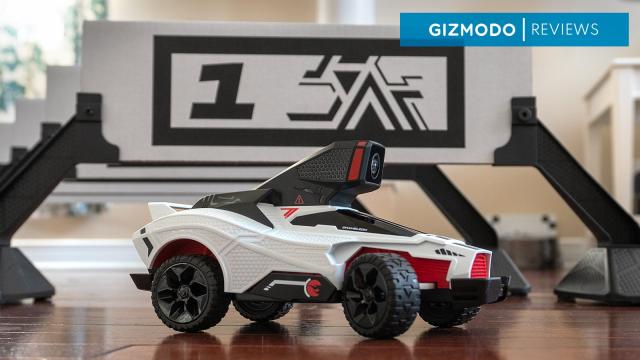Although I tend to roll my eyes at toys that offer enhanced play through an app that adds virtual effects on a mobile device’s screen, I think that Velan Studios has come up with a convincing use case for augmented reality with Hot Wheels: Rift Rally, which makes driving a tame RC toy actually feel like you’re behind the wheel of an over-powered street racer straight out of The Fast and the Furious.
The last time I was impressed by a toy that relied heavily on augmented reality was Lego’s Hidden Side collection, which featured buildable vehicles and buildings for a team of brick-based paranormal investigators. The ghosts and other spooky creatures that your figs were supposed to be hunting were revealed through a mobile AR app, but while the execution was slick, the novelty wore off shortly after thinking, “this is neat!” Apparently, I wasn’t alone, because it didn’t take long for Lego to discontinue the Hidden Side line.
Hot Wheels: Rift Rally isn’t a new idea — it’s based on the same technology that Velan Studios developed for Nintendo’s Mario Kart Live: Home Circuit — but it improves upon that experience in many ways, including not being completely dependent on the Nintendo Switch hardware. But the biggest appeal for me is how it manages to make a kid-friendly remote control toy car feel more exciting than it really is when racing around indoors, saving my home’s walls and furniture from high-speed crashes in the process.
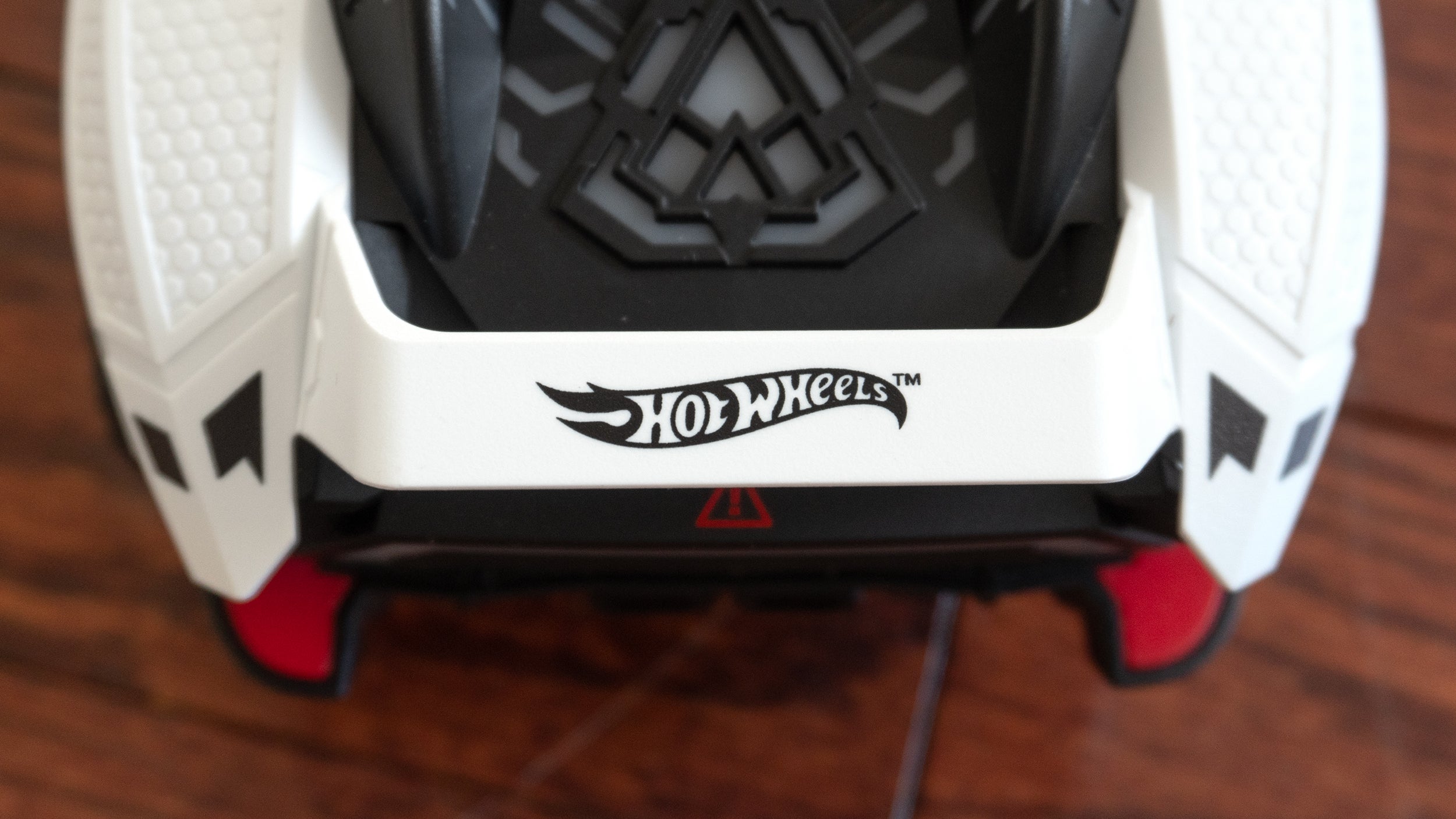
Hot Wheels: Rift Rally
WHAT IS IT?
A remote control toy car that's driven from a first-person perspective through a PS4, PS5, or mobile device, with virtual effects, obstacles, competitors, and challenges added on screen.
PRICE
$US130 ($180) for the Standard Edition, and $US150 ($208) for the Collector’s Edition which includes a black version of the RC vehicle, and a special vehicle that can be unlocked in-game.
LIKE
Races can feel genuinely exciting and challenging, and you get to design and build your own custom track layout as often as you want.
DISLIKE
The on-screen virtual effects can often hide obstacles in real life, leaving you confused as to why the car has come to a sudden stop.
Climb Aboard the Hot Wheels Chameleon
The RC car included with Mario Kart Live: Home Circuit looked more or less like the cartoonish go-karts featured in Nintendo’s popular racing series, and while the Hot Wheels: Rift Rally vehicle still looks like an over-the-top, off-road racer you’d only find in a video game, the design feels a lot less cartoonish and cute. It’s got that Hot Wheels edge to it.
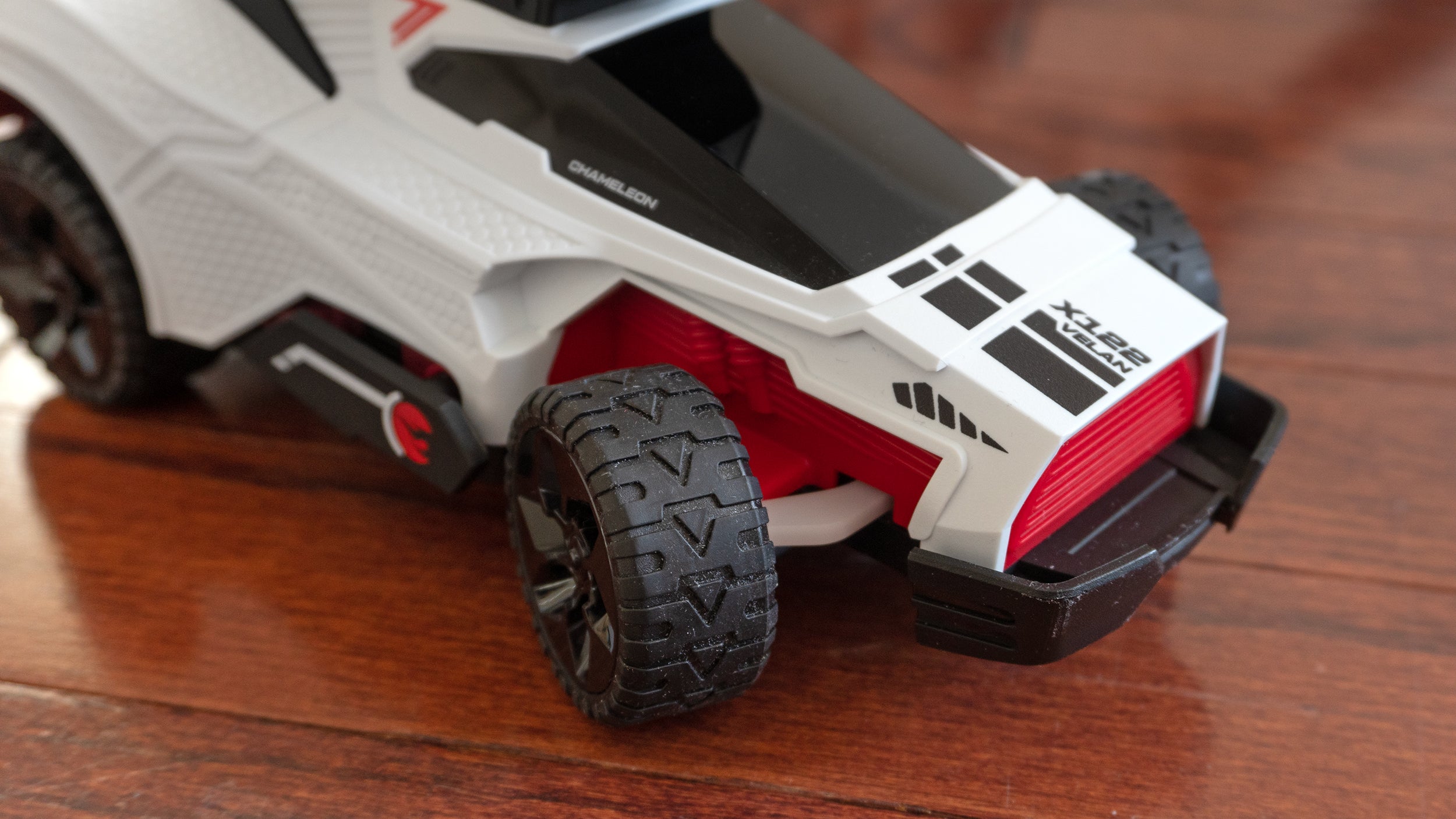
The Chameleon, as it’s called, is a fairly compact RC toy, but does feature proportional steering, which means you have complete control over how sharply it turns depending on how far you push the steering controls.
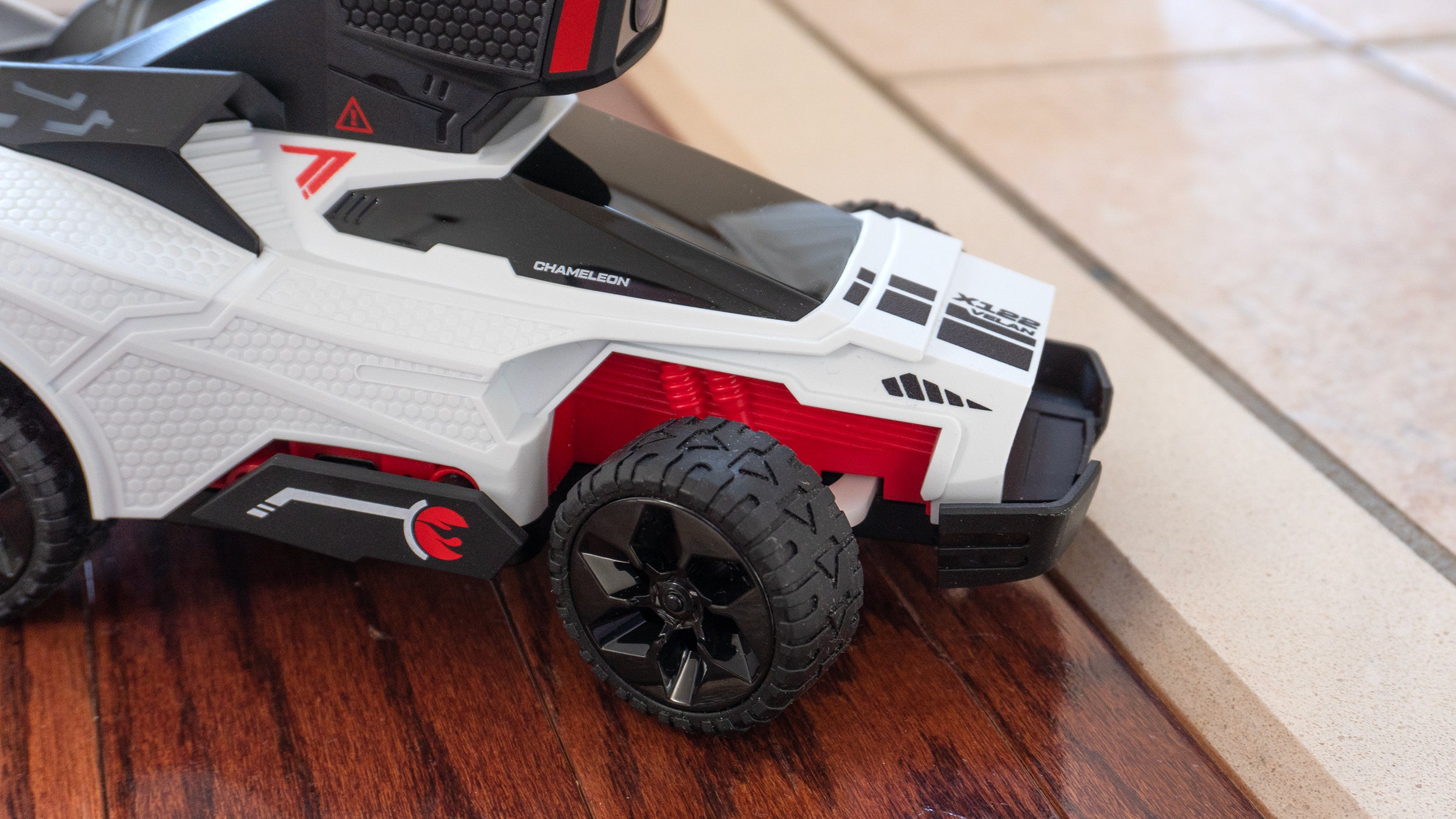
The vehicle’s rubber tires have a decent amount of grip, although they will quickly get dusty and lose some traction if you don’t maintain immaculately clean floors (guilty). I also found that, on a few occasions where I wasn’t racing fast enough, the car wouldn’t have enough momentum or power to get over a small bump separating my home’s wood and tile flooring. It was something I had to learn to plan around when designing a race course.
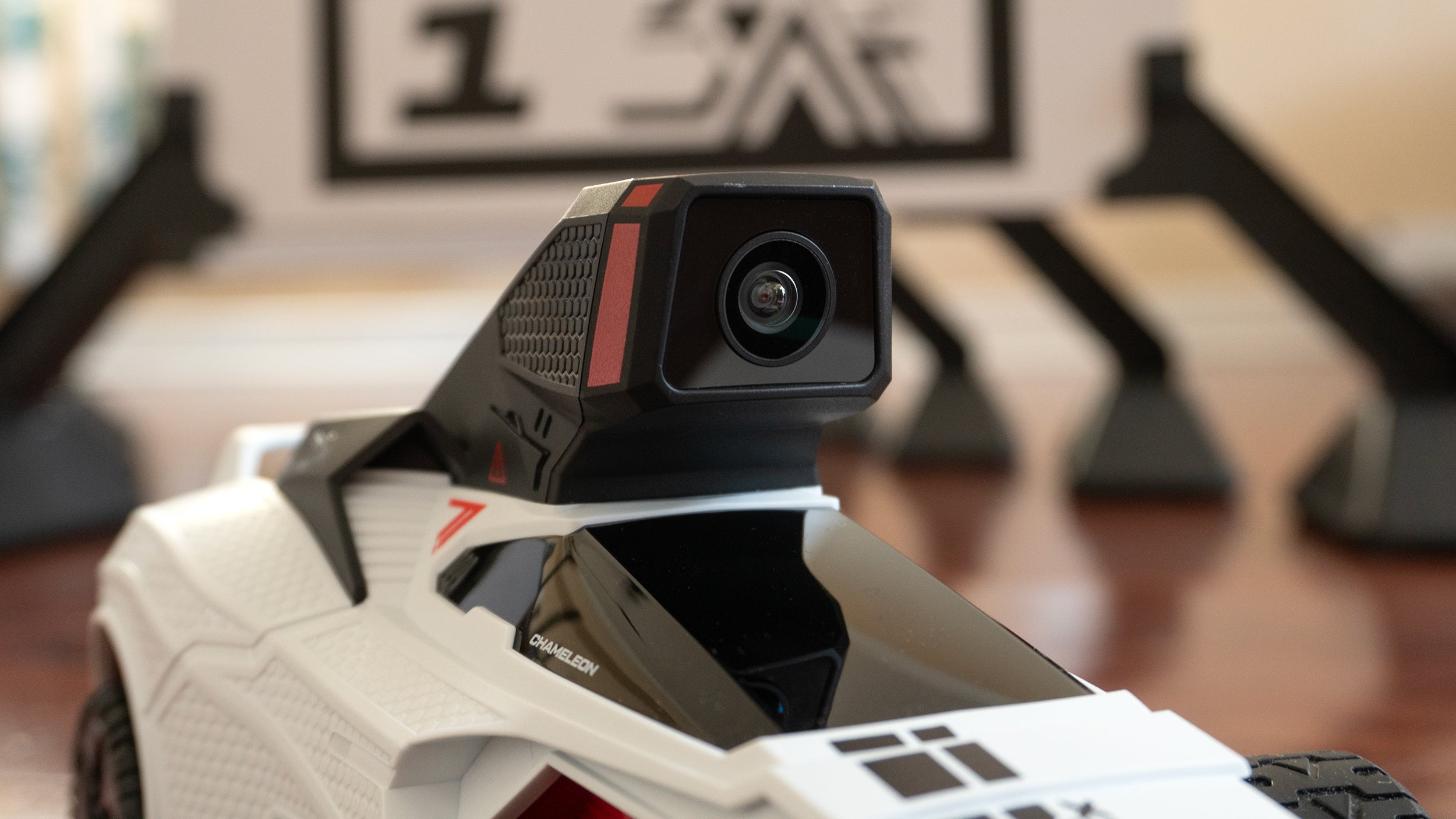
But the Chameleon car’s appearance doesn’t really matter, because you never actually see the real RC toy in the game. Perched above the vehicle, and jutting slightly forward, is a live-streaming camera that is positioned so the RC toy doesn’t appear in frame at all. Instead, you’ll race from the driver’s perspective, streamed by the camera to a TV or mobile device, although from a chase view that represents where the Chameleon is with a virtual image displaying one of several unlockable virtual cars, each with a different design. Which care you play as also affects the Chameleon’s handling, which I’ll get into later.
It means Hot Wheels didn’t really need to put much thought into the design of the Chameleon at all — it could have just as easily put four wheels on a plastic brick without changing the Rift Rally experience, so there’s less incentive to splurge an extra $US20 ($28) on the Collector’s Edition of the toy/game bundle, which includes a black version of the Chameleon instead (as well as some additional unlockable content).
Bring Your Own Screen and Bluetooth Controller
Hot Wheels: Rift Rally’s $US130 ($180)/$US150 ($208) price tag isn’t entirely accurate, because there’s not much you can really do with the RC toy straight out of the box. You can only actually drive the car when it’s paired with other hardware, but unlike Mario Kart Live: Home Circuit, which is only compatible with the Nintendo Switch, Rift Rally works with the Sony PlayStation 4, PlayStation 5, or Apple mobile devices, going as far back as the iPhone 8 and second generation iPhone SE. The lack of Xbox Series X|S support seems odd to me given the Hot Wheels Unleashed game is available across so many platforms.
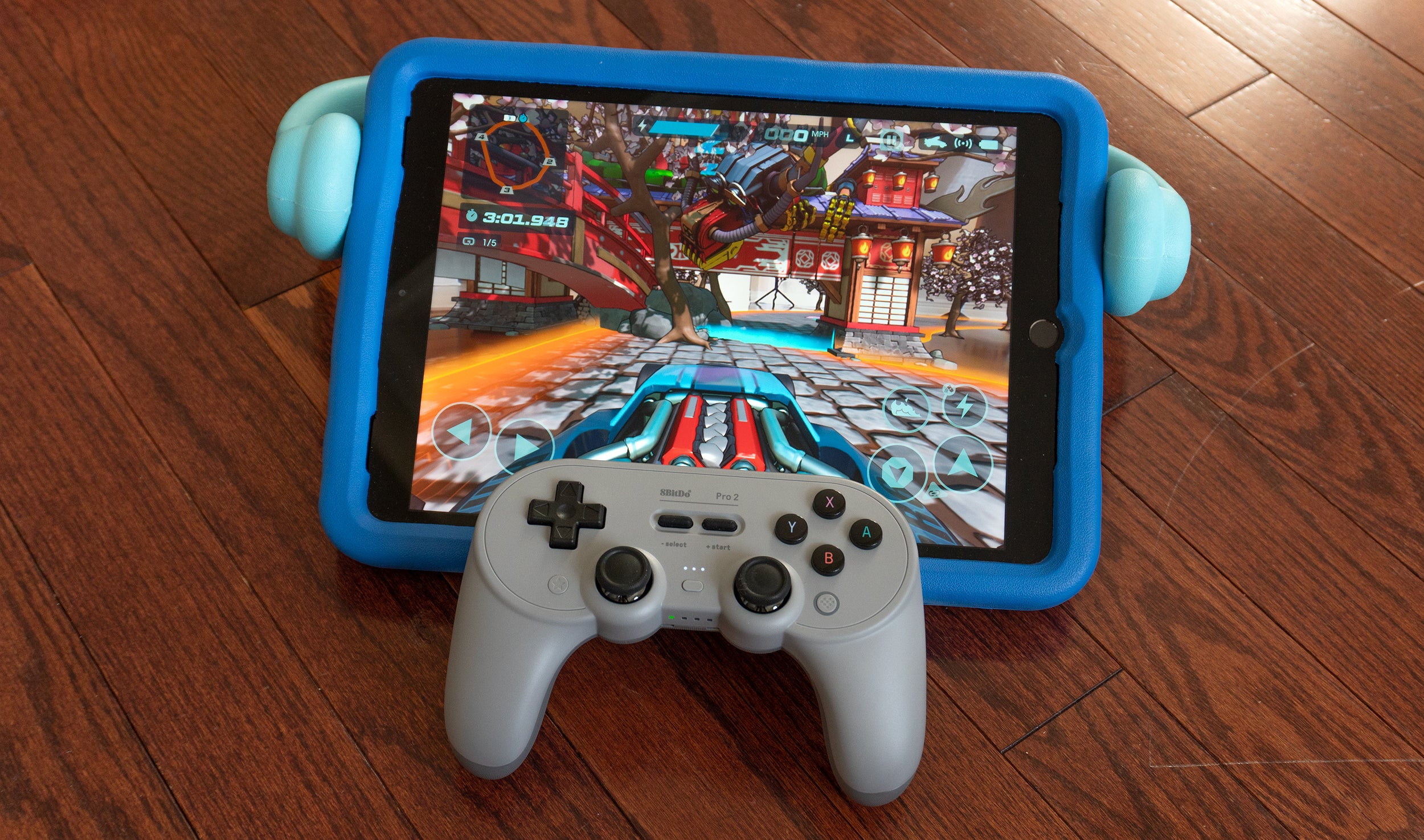
I tested Hot Wheels: Rift Rally with an older generation iPad, and while it includes on-screen touch controls, those are always awful and annoying. Thankfully, just a few weeks ago, 8BitDo introduced iOS support for several of its game controllers, so I was able to test Rift Rally with the 8BitDo Pro 2 controller, which provided a much better racing experience than tapping the screen.
How to Design a Rift Rally Course
I wouldn’t say that Hot Wheels: Rift Rally provides a more enjoyable racing experience than a pure video game like Hot Wheels Unleashed, but it does introduce the novelty of turning your actual home into a race course. That might not be an appealing hook for adults, but to my seven-year-old, it was an activity that easily gobbled up an entire afternoon — an impressive achievement, as any modern parent will attest.
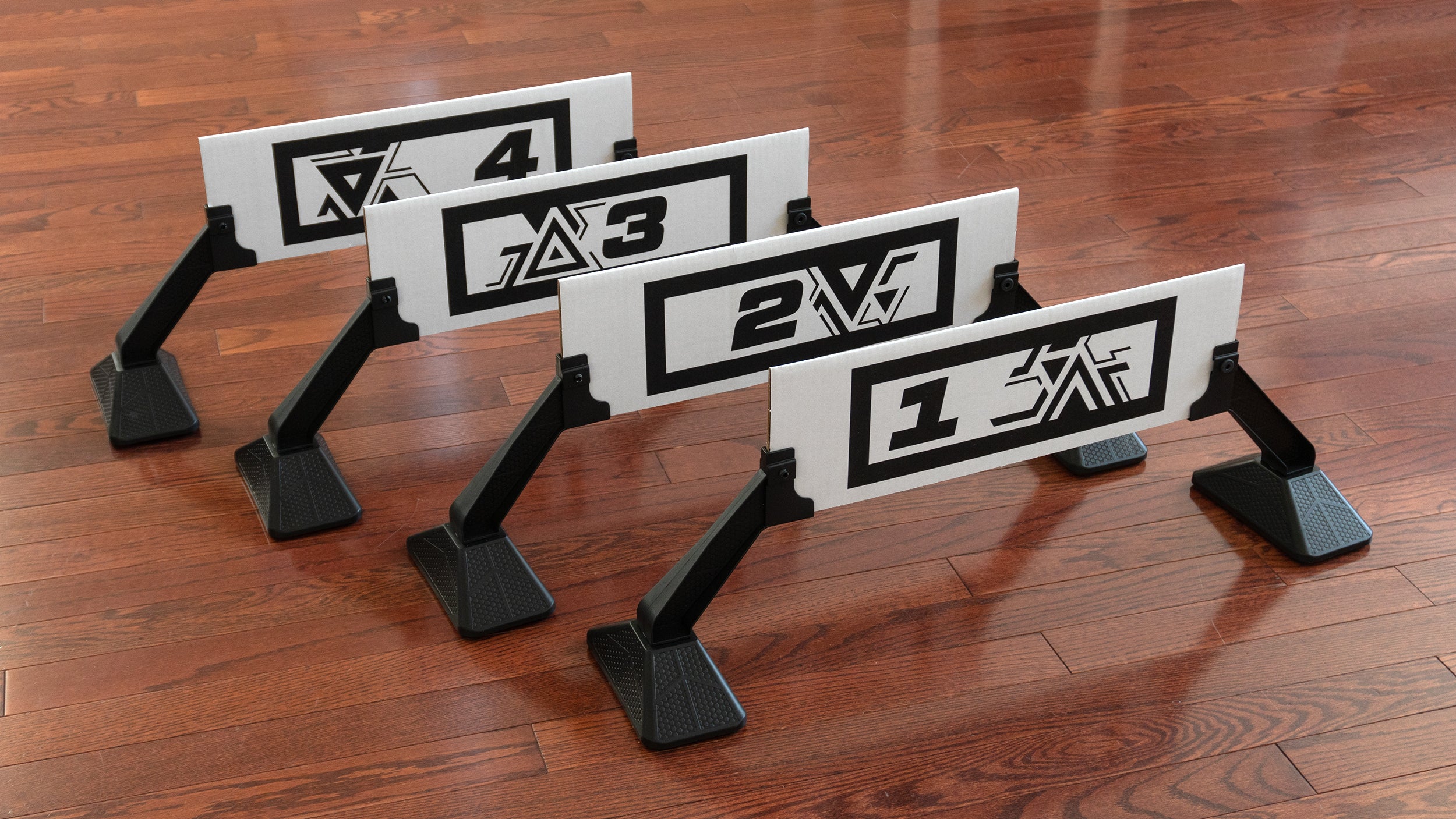
The Rift Rally set includes four build-it-yourself race gates printed with seemingly random geometric artwork that the app relies on for building your course. For each race gate you plop down in the real world, it will position a 3D virtual replacement in the game world. The physical gates are sturdy enough, but there’s two ways I think they could be improved. The top signage is made of cardboard, and on more than one occasion, my son accidentally tripped over one, bending and creasing the cardboard in the process. The plastic support stands for each gate also feature rubber feet so they don’t easily slide around (your car will crash into them from time to time), but a little more weight would help make them more resilient and immobile when crashes occur.
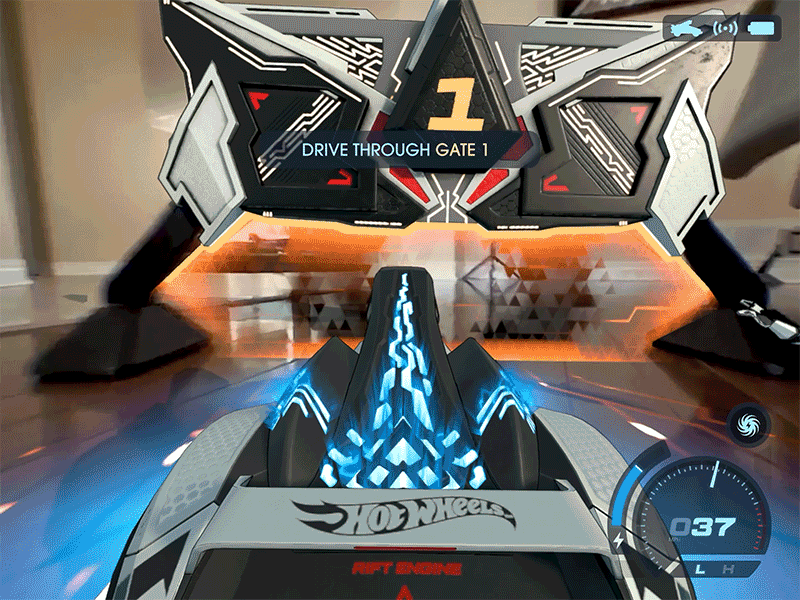
After positioning the four gates, creating a custom race track is as easy as simply driving the RC Chameleon car around. You need to make sure you drive through all four gates in sequence, but in between them, you’re free to add twists and curves and corners to make the track as complex as you want. The track you’re creating is drawn out on screen as you drive, but there’s really no way to fix a specific section should you make a mistake. You’ll need to start from scratch again, so planning ahead, and taking your time while laying out your course, is the best approach.
RC in AR is Cool AF
I was pleasantly surprised at how engaging the actual racing experience is in Hot Wheels: Rift Rally. Watching the Chameleon car itself race around a room isn’t terribly exciting because its top speed doesn’t come anywhere near close to an RC toy designed for outdoors play, but it was an entirely different racing experience through the app.
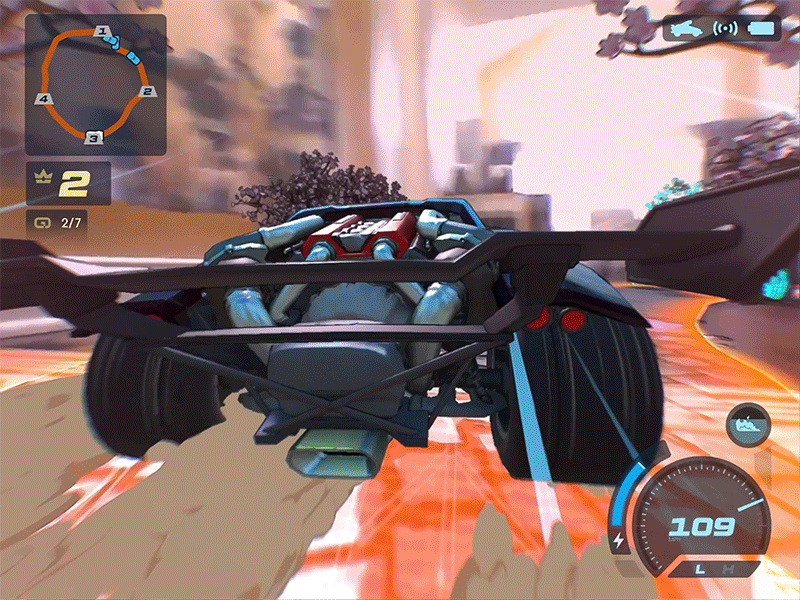
From a third-person perspective, the Chameleon feels almost uncontrollably fast with the 3D scenery and other rendered effects flying by. Even jumps off virtual ramps feel exciting, despite knowing you’re just watching a virtual on-screen car doing all the stunts. It’s a reminder that while we have yet to really figure out the ideal use for augmented reality effects, there’s still something that clicks in the brain when it’s seeing real-life footage upgraded with video game elements and effects in real-time. Maybe we should start calling it enhanced reality instead of just augmented.
What’s especially cool here is that each care you play as has its own acceleration, top speed, and other stats. The Chameleon’s handling will actually adjust to match these — hence the name. Cars even come with special abilities, such as attacks to use on opposing drivers, which will make both virtual and real opponents actually stop moving.
Augmented Reality Is Still Far From Perfect
If there’s one big drawback to the Hot Wheels: Rift Rally experience, it’s that augmented reality, at least as it’s implemented using the hardware on a kid’s toy, is far from perfect. There were times when I’d be driving towards a gate too fast, or at an awkward angle, and would crash into one of the supports, moving it a half-inch or so. That would occasionally then cause the virtual race track overlaid on my floors to shift considerably, and on more than one occasion, it would end up overlaid on an impassable obstacle, such as a wall.
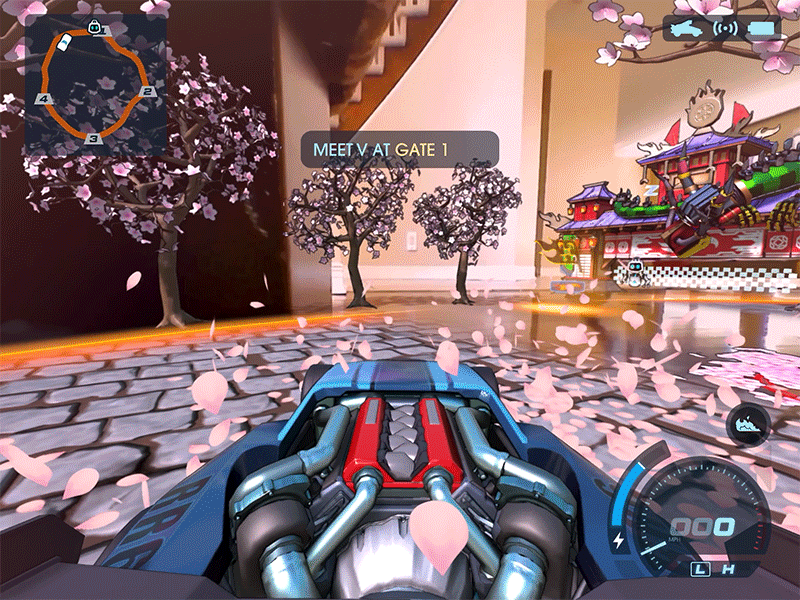
And as impressive and interactive as the game’s rendered on-screen effects can be, they occasionally ended up occluding real world hazards. One course I designed incorporated a living room chair with the track going right beneath it, but the virtual track, along with some rendered trees dropping cherry blossoms, made it hard to gauge how far away one of the chair’s legs was, resulting in the vehicle coming to a sudden, confusing, stop during a race, until I looked up from the screen and saw the car had crashed into a chair leg.
It didn’t happen all the time, but it happened enough for me to change how I laid out the tracks in my living and dining room. I started deliberately keeping the track a safe distance from obstacles like furniture, which felt a little frustrating, because that’s part of the appeal of turning your home into a race course.
There’s also limitations to using real-world RC cars for the game, as any non-virtual opponents you want to race against (the game can support up to four simultaneous human players) will need to supply their own Chameleon.
Does Hot Wheels: Rift Rally Take the Checkered Flag?
My biggest takeaway from Hot Wheels: Rift Rally is that it takes something my son loves to do: driving RC cars around the house, and manages to make it both more exciting, but also less stressful for a dad who cringes when he sees an RC vehicle crash into a wall or a piece of furniture. The augmented reality effects added through the app means a kid doesn’t have to keep the pedal to the metal to have a racing experience that feels exciting. And they can smash up as many virtual obstacles as they want, without a parent constantly reminding them to be careful.
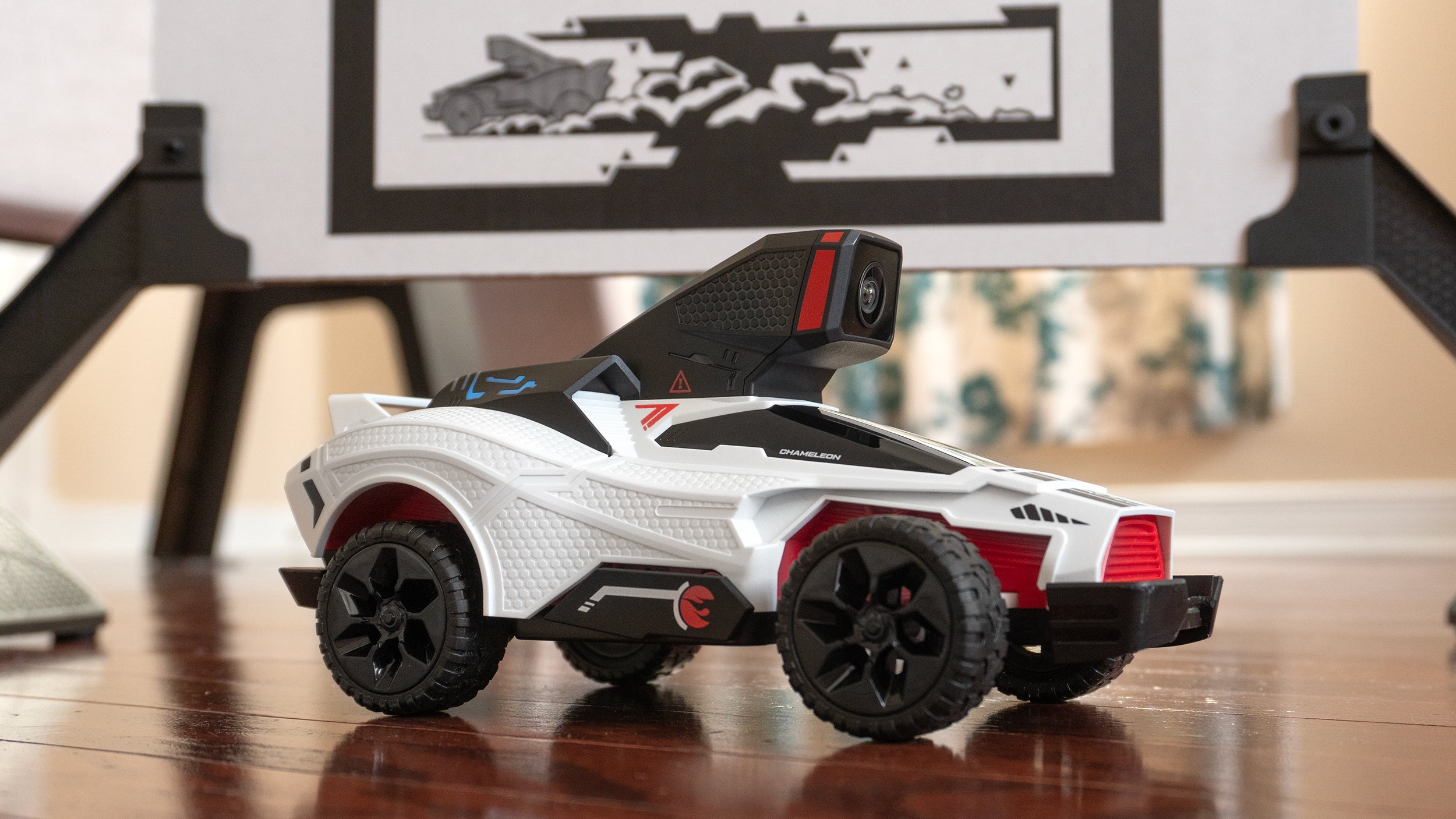
It’s just important to remember that Hot Wheels: Rift Rally doesn’t actually cost $US130 ($180)/$US150 ($208). It needs to be paired with a pricey Apple mobile device, or a recent-generation gaming console, to be able to actually use it. Part of me wishes I could pair the Chameleon car directly to a Bluetooth controller and let my son drive it around without a screen when he gets maxed out on screen time, but it’s another relatively expensive toy that’s dependent on an even more expensive toy to use.
